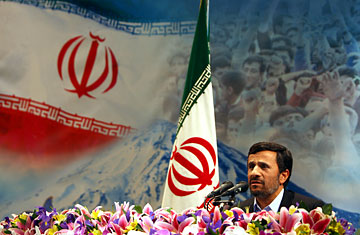
Iranian President Mahmoud Ahmadinejad at a Feb. 16 press conference in Tehran, warning that world powers would regret moves to slap new sanctions on Iran
Iran came out on top in a high-powered diplomatic simulation of the nuclear standoff held at Harvard late last year — an exercise that played out the conflict based on the real-life positions and inclinations of all the main players. Former National Security Council Iran expert Gary Sick, who led Team Iran in the exercise, wrote afterward that, for Washington, "the pursuit of sanctions in this game, as in the real world, became an end in itself, with little impact on Iran or its ability to continue [uranium] enrichment." And that appears to be a fair assessment of the Obama Administration's current Iran efforts.
U.S. diplomats are hard at work this week trying to persuade reluctant partners to back new Iran sanctions at the U.N. Security Council. Having last week told the Senate that the U.S. could get a new sanctions resolution through the Security Council in the next 30 to 60 days, Secretary of State Hillary Clinton on Monday allowed that such a resolution would more likely come "sometime in the next several months." Clinton was in Brazil Wednesday, hoping to enlist the support of President Luiz Inácio Lula da Silva for new sanctions. But Lula warned ahead of the meeting that "it is not prudent to push Iran against a wall" and urged dialogue with Iran as the basis of finding a solution. And his Foreign Minister warned after the talks that new sanctions "could be counterproductive."
Deputy Secretary of State James Steinberg flew to Beijing this week, hoping to smooth over China's anger at recent U.S. actions over Taiwan and the Dalai Lama's visit in order to tackle the more arduous task of persuading China to drop its opposition to new U.N. sanctions against Iran. But Chinese officials responded publicly with what appeared to be a blunt no, opposing new sanctions and insisting that dialogue be given more time to bear fruit.
Dialogue for Washington, right now, is largely about Iran rather than with Iran, primarily focused on a new sanctions package that aims to tighten access of Tehran's nuclear industry — and of corporations tied to the Revolutionary Guards Corps that anchors the regime — to international trade, travel and finance. Although U.S. officials are trying to overcome the skepticism of Security Council member states such as Brazil, Turkey and Lebanon, veto-wielding China and Russia are the key targets of U.S. lobbying, with Moscow — at least in its posture — offering Washington the greater prospect of success. Russian leaders reiterated this week that they are not satisfied with Iran's level of cooperation with the transparency demands of the International Atomic Energy Agency (IAEA), and that they would be prepared to contemplate further sanctions if there was no progress in diplomatic efforts.
That, of course, is not exactly a ringing endorsement, and reports suggest that Russia has also indicated that even the relatively limited sanctions package proposed by Washington would have to be watered down to win Moscow's approval. When, and if, any new measures are adopted by international consensus, they're going to be well short of the "crippling sanctions" that Secretary of State Clinton threatened last year, and they will be highly unlikely to change Iran's behavior.
The sanctions-skeptical governments say that, despite the need for Iran to display more transparency, there's no evidence that Iran is actually building nuclear weapons — and the issue is therefore not a pressing global security crisis. And they stress the priority of dialogue over coercion. While the U.S. and its European allies treated last year's proposed deal under which Iran would swap much of its enriched-uranium stockpile for reactor fuel as a kind of final offer — and took Tehran's demand to renegotiate its terms as a no — China, Russia, Turkey, Brazil and others are less inclined to buy the Washington conventional wisdom that engagement has been tried and has failed. Chinese officials have previously suggested that the diplomatic process might need years to succeed.
The Obama Administration's Iran diplomacy, right now, is focused largely on the vain pursuit of international consensus behind its own view of the need for more coercive measures against Tehran — even while it is generally assumed that any new measures that result from those efforts will be ineffective. Iran, for its part, continues with its nuclear work, while offering revised versions of the uranium-fuel-swap deal more to its liking. Despite the exhortations of the likes of Sarah Palin, U.S. military action against Iran's nuclear facilities remains unlikely because of the strategic cost-benefit equation: the negative consequences of such action are potentially dramatic across a number of fronts, while even a successful bombing campaign would only slow down Iran's nuclear program by a couple of years. Israel, of course, may beg to differ and take matters into its own hands if sanctions fail to change Iran's calculations — particularly since its political and security establishment has told its people that an Iran capable of building nuclear weapons represents a mortal threat on par with Nazi Germany.
For now, however, just as in the Harvard simulation, the strategy being pursued by the U.S. and its allies leaves the initiative — and, perhaps, the outcome — in the hands of the Iranians.
